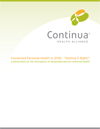 This Vision Paper is a creative synthesis of many ambitious ideas about possible developments in the field of telehealth. These imaginative glimpses of telehealth futures, crafted by some of the leading health and technology experts in the field, project a fascinating new world of personal health possibilities that could become very real within the next few years.
This Vision Paper is a creative synthesis of many ambitious ideas about possible developments in the field of telehealth. These imaginative glimpses of telehealth futures, crafted by some of the leading health and technology experts in the field, project a fascinating new world of personal health possibilities that could become very real within the next few years. Making "best-case scenarios" such as these come true is part of the Continua Alliance's mission to promote sustained leadership in technology R&D, service innovation, public policy, corporate strategy, and personal behavioral changes around the world.
Download Connected Personal Health in 2015: "Getting it Right!" White Paper (.pdf, 421 KB).
Download from the eHealthNews.EU Portal's mirror: Connected Personal Health in 2015: "Getting it Right!" White Paper (.pdf, 421 KB).
For further information, please visit:
http://www.continuaalliance.org
Related news article:
About Continua Health Alliance
Continua was launched in June of 2006 to address the lifestyle, health and demographic trends contributing to the skyrocketing costs of healthcare. The Continua Health Alliance was established to find methods to address the rise of chronic health conditions due to the rapid aging of the population and the need to shift healthcare from traditional institutional settings to impacting consumers everyday lives, particularly in the home. Promoting members include A&D Medical, ActiveHealth Management, Aetna, Ascension Health, AstraZeneca, Avita, Baxter, Bayer HealthCare, BodyMedia, Boston Scientific, Cisco, Dell, Dynastream Innovations, General Electric, Healthe, IBM, iMetrikus, Intel Corporation, Kaiser Permanente, Konami, Living Independently Group, Inc., Medtronic, MicroLife, Nautilus, NHS Connecting for Health, Nokia, Nonin, Omron Healthcare, Oracle, Panasonic (Matsushita Electric), Center for Connected Health, Pfizer, Philips, Polar, PriceWaterhouseCoopers, RMD Networks, Roche, Samsung, Sharp, Siemens, Sprint, St. Jude Medical, TechnoGym, Telus, Texas Instruments, Tunstall, Welch Allyn, and Zydacron. All members of the group share a vision of establishing an ecosystem of connected personal health and fitness products and services, making it possible for patients, caregivers and health care providers to more proactively address ongoing health care needs.
To learn more about the Continua Health Alliance and its participating companies and to find out how to become a member, visit http://www.continuaalliance.org.